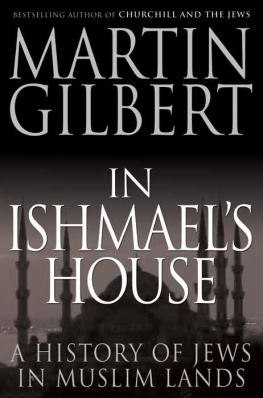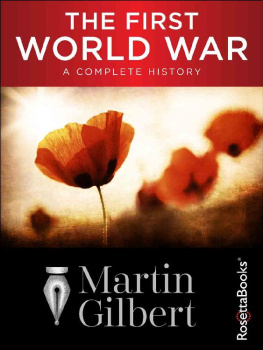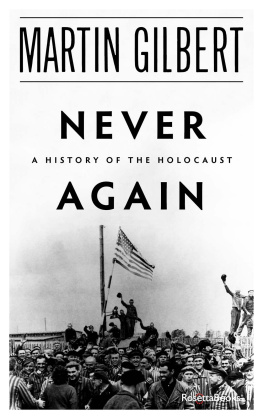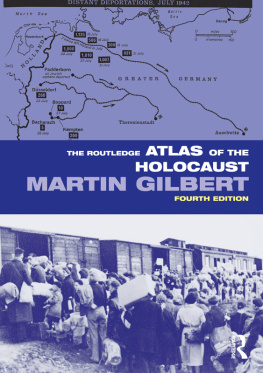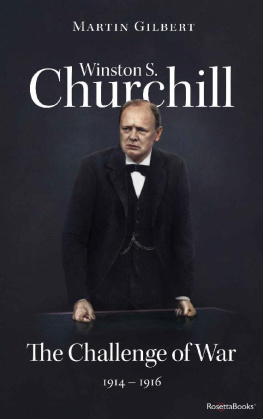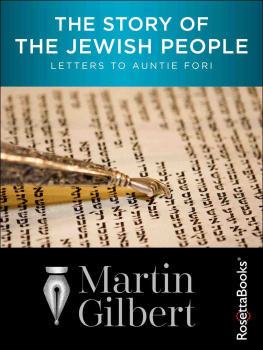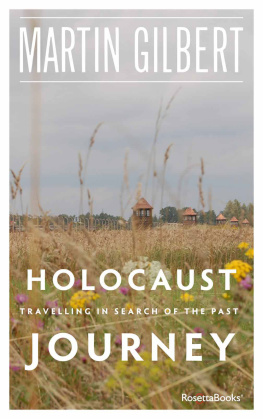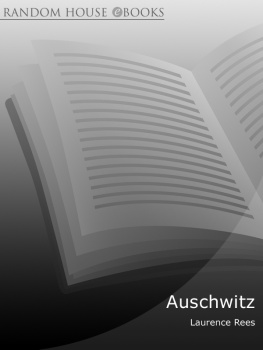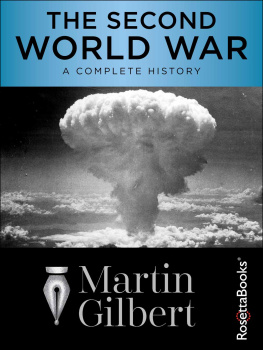Auschwitz and the Allies
Martin Gilbert
Auschwitz and the Allies
Copyright 1981 by Martin Gilbert
All rights reserved. No part of this book may be used or reproduced in any form or by any electronic or mechanical means, including information storage and retrieval systems, without permission in writing from the publisher, except by a reviewer who may quote brief passages in a review.
Electronic edition published 2015 by RosettaBooks
Cover design by Brehanna Ramirez
Cover photo of Auschwitz-Birkenau Complex, Oswiecim, Poland, ca. June 26, 1944, courtesy of Central Intelligence Agency archives
ISBN (EPUB): 9780795346712
ISBN (Kindle): 9780795346729
www.RosettaBooks.com
Contents

Introduction
The stages by which the Allies learned of the Nazi mass murder of the Jews, and of how they responded, form the foundation of this book. To this end, I have given particular prominence to those atrocity reports which were received in the West during the war itself, and have traced the Allied reaction to them. This book is an account of the facts of the killings as they filtered out of Nazi-dominated Europe, and of the Allied reaction to these facts, beginning with a series of explicit but, as so often, incomplete reports which reached London and Washington during the summer and autumn of 1942.
In order to show the gap between what was known at any given time, and what was actually taking place, I have also outlined the principal deportations and murders as they happened, making it clear whenever the facts were unknown to the Allies at the time.
It was not until the summer of 1944 that the Allies knew that Jews were being deported to Auschwitz from throughout Europe, and were being murdered there. This knowledge, hitherto kept secret, obscured, and not therefore a part of the many protests against the killing of Jews, had been smuggled out of Auschwitz itself by two pairs of Jewish escapees, whose story I tell. The Allies also received in the summer of 1944 a third account of the fate of the Jews inside Auschwitz, which reached the West through a Polish medical student, a non-Jew, who had also escaped from the camp.
The aim of this book is to show how the Alliesand the Jewish organisations outside Nazi-dominated Europe that were monitoring the fate of their fellow-Jewsresponded to each new piece of information as it reached them, starting in the very first months of the war. Often, those in the West only learned of specific killings long after they had taken place. Unfortunately for any decisive response, the period during which the facts first became known in detail, and during which most of the six million Jewish victims of Nazism were being killed, coincided with the period of maximum German military superiority, and corresponding Allied military weakness.
Throughout the war the Germans pursued a policy of deliberate, and almost always effective deception, with regard to mass murder. In 1944, as that deception began to fail, Allied protests grew, and such help as could be given to the Jews was intensified. This culminated in the threat to bomb targets in Budapest if the Hungarian government continued to allow Jews to be deported. This threat led to the Hungarian government refusing to allow the Germans to deport the 100,000 Jews in Budapest in July 1944. But the murder of Jews somewhere or other within the German domains only stopped when Germany itself was overrun by the Allies and the camps, among them Belsen and Dachau, were liberated in April and May 1945. Anthony Eden, the British Foreign Secretary, was right when he said, in the summer of 1944, that the principal hope of bringing the killings to an end remained the speedy victory of the Allied nations. The Nazi killing machine had the power and the will to continue behind German lines until Germany itself was overrun.
Martin Gilbert
Merton College, Oxford
21 March 2001
Acknowledgments
In the course of writing this book, I have received valuable help from those individuals who participated in the events which I have described, and who gave me both their personal recollections and access to their private papers. In this regard I should like to thank Benjamin Akzin, Sarah Altusky, Chaim Barlas, Arieh Ben-Tov (formerly Hassenberg), Reuven Dafni, Mrs Eve Gibson, Dr Nahum Goldmann, Rosine de Jong, Dr M. Kahany, Lilli Kopecky (General Secretary, Public Committee of Auschwitz survivors in Israel), Dr M. Krausz, Erich Kulka, Professor Shalom Lindenbaum, Joseph Linton, the late Arthur Lourie, Jona Malleyron, Oskar Krasnansky, Count Edward Raczyski, and Yaacov Yannay.
I also received considerable help from three other eye-witnesses of the events which I describe: from Chaim Pazner (formerly Pozner), Vice-Chairman of the Directorate of Yad Vashem, Jerusalem, who provided me with documents and recollections of his wartime work in Geneva, and who gave me great encouragement at every stage of the writing of this book; from Gerhart Riegner, who put at my disposal the Geneva archives of the World Jewish Congress, scrutinized the book in typescript, and gave me his own personal account of the events and atmosphere of those years; and from Professor Rudolf Vrba, who was extremely patient in answering my many questions about his escape from Auschwitz in the spring of 1944, and in putting material about his escape at my disposal. A second escapee, Czeslaw Mordowicz, also gave me details of the journey during which he and a colleague brought to the west the first eye-witness account of the murder of Hungarian Jews at Auschwitz in May 1944.
Because this book arose out of two lectures which I was asked to give at Yad Vashem, Jerusalem, I should like to thank in particular both the organizer of those lectures, Dr Yisrael Gutman, for his personal encouragement, and his colleague Dr Shmuel Krakowski, Director of Archives at Yad Vashem, for having shown throughout the period of my researches the greatest patience in answering my many queries, and in providing me with documentary material. No one who has worked in the Yad Vashem archive can fail to be impressed by the courtesy and consideration of all its staff, headed by the Chairman of its Directorate, Dr Yitzhak Arad.
I also received important help from the Director of the Central Zionist Archives, Jerusalem, Dr Michael Heymann, and from his staff; I am indebted in particular to Israel Philipp, Deputy Director of the Central Zionist Archives, for guiding me through their comprehensive collection of wartime documents.
I am also grateful to those librarians, custodians of archives, and directors of different institutions who made available previously unpublished material: the BBC Written Archives Centre, Caversham; the Jewish Chronicle Library; the Institute of Jewish Affairs; the Kressel Collection, Oxford Centre for Postgraduate Hebrew Studies; the Library and Archives of the Polish Institute and Sikorski Museum, London; the Public Record Office, London (for the records of the Air Ministry, the Colonial Office, the Foreign Office, the Ministry of Information, the Prime Ministers Office, the War Cabinet and the War Office); the Franklin D. Roosevelt Library, Hyde Park (for the records of the President, and of the War Refugee Board); the United States National Archives (for the records of the Defense Intelligence Agency, of the State Department, and of the United States Strategic Bombing Survey); the Weizmann Institute, Rehovot (for the Weizmann papers); the World Jewish Congress archives, New York; and the World Jewish Congress archives, General Secretariat, Geneva.
Each new book on any aspect of Jewish history in the Second World War must derive both inspiration and guidance from books and articles already published, and from material in preparation. This book is no exception, and I should like to thank those historians and writers whose work has been of importance to me in directing the course of my own researches. I am particularly grateful to the pioneering efforts of Yehuda Bauer, John Conway, Jzef Garliski, Serge Klarsfeld, Walter Laqueur, Miriam Novitch, Bernard Wasserstein, and Ronald W. Zweig, each of whom has also been most generous in discussing various points with me, and providing me with material. I am also grateful to Danuta Czech, Raul Hilberg and the late Arthur D. Morse whose published work is indispensable for all students of the war years.
Next page

